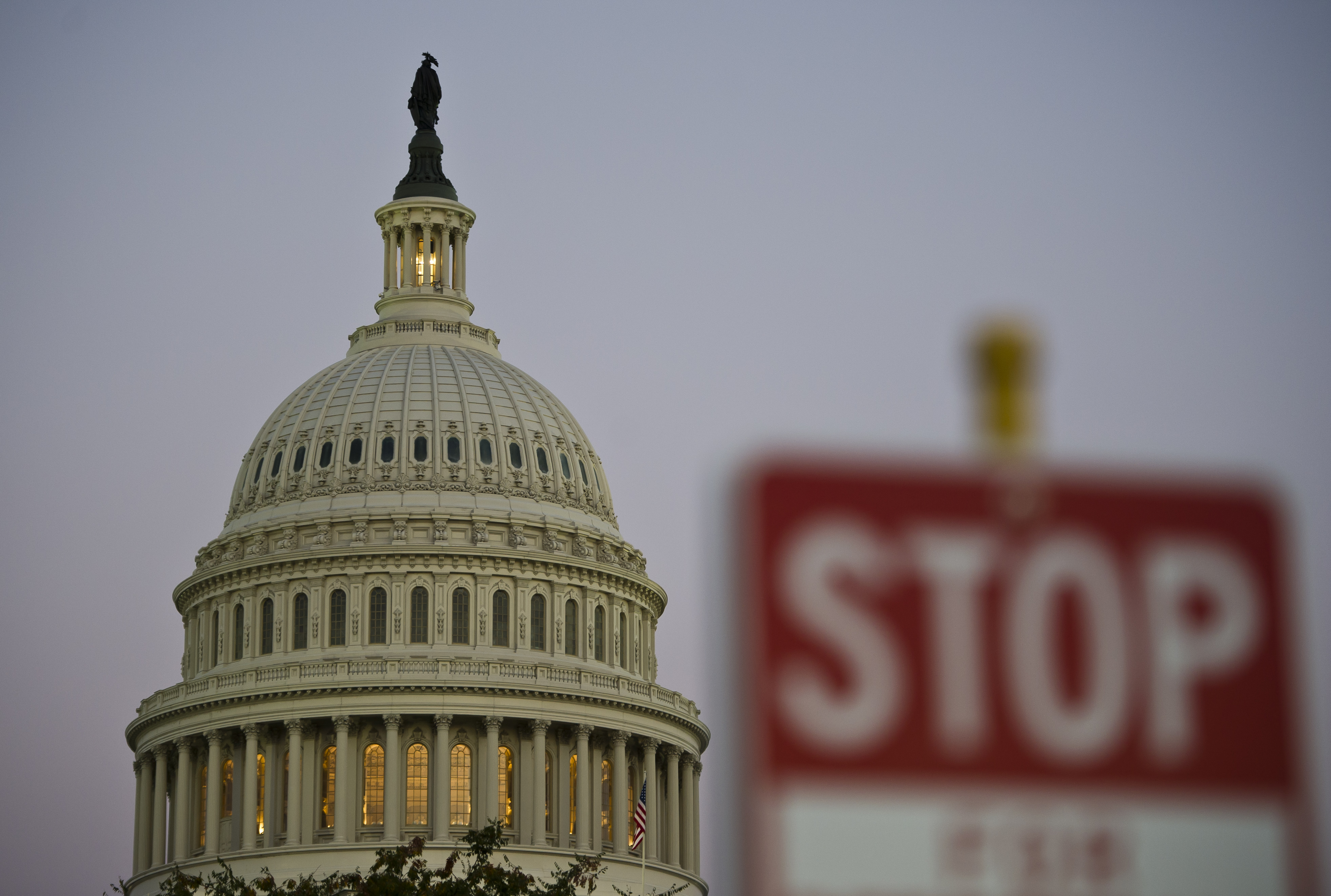The debt ceiling is madness
It's long past time to end it


Here we go again. If Congress — which is leaving town for its August recess — doesn't pass an increase in the debt ceiling by the end of September, the United States government will begin defaulting on its obligations, which could well cause a global financial meltdown. As if we didn't have enough problems already.
As this moment of crisis approaches, we should solve this problem once and for all. Not simply by raising the ceiling — which of course we have to do — but by getting rid of it altogether. The debt ceiling is nothing but trouble, and we should drive a stake through its heart.
If you're like most people, you had probably never heard of the debt ceiling before 2011, when Republicans newly in control of the House of Representatives decided they could use it as weapon of extortion against the Obama administration. That's because up until then, it was a piece of Washington esoterica that no normal person would have occasion to care about. Raising the debt ceiling doesn't actually spend any money; all it does is allow the Treasury to pay the bills for the things Congress has already decided to spend money on. The ceiling is always raised incrementally, and whenever it approached, members of the opposition party would make a few floor speeches condemning the president's profligate spending, then an increase would be passed in due course. A few of those members might cast a symbolic vote against it, but no one seriously contemplated not increasing it, because that would be ludicrously reckless.
The Week
Escape your echo chamber. Get the facts behind the news, plus analysis from multiple perspectives.

Sign up for The Week's Free Newsletters
From our morning news briefing to a weekly Good News Newsletter, get the best of The Week delivered directly to your inbox.
From our morning news briefing to a weekly Good News Newsletter, get the best of The Week delivered directly to your inbox.
Once Barack Obama became president, however, the Republican Party all but made "ludicrously reckless" its official motto. In 2011, GOP members demanded deep budget cuts in exchange for increasing the ceiling, causing a standoff that would eventually result in America's bond rating being downgraded. Although the nightmare scenario of a default was averted, we went through a similar crisis in 2013. Republicans realized that because Democrats actually care about responsible governing, their concern could be used against them to extract policy concessions (or at least try).
But let's back up. Why do we have a debt ceiling in the first place? After all, it doesn't actually perform any practical function other than forcing us to increase it or face a disaster. The story goes back to 1917, with its roots in the tug for power between the executive and legislative branches. In order to raise money to fund our involvement in World War I, Congress created Liberty Bonds, but put limits on the Treasury Department's ability to issue them without periodically getting Congress' permission. Then in 1939, Congress passed a law putting a limit on all the debt the government issued, thereby requiring the executive branch to come before Congress from time to time and ask for the authority to issue new debt. Congress has always obliged in the years since, but they usually raise the ceiling only enough to allow for another year's worth of spending or so. (If you're eager to read a history of the debt ceiling, you can find one here.)
So the fact that there is a debt ceiling is just an accident of history. The only other OECD country that has a debt ceiling is Denmark, and they set theirs high enough that it doesn't precipitate a political crisis when it approaches.
If we were to eliminate it, nothing would change — except for the fact that one party wouldn't be able to plunge us into a potential crisis by withholding its agreement to raise it. Despite what tea partiers might like to believe — or convince their constituents, who hear a candidate say "I won't vote to raise the debt ceiling!" and assume it means he's going to cut spending — the debt ceiling doesn't limit the country's debt in any way. To be crystal clear, how much debt we have is determined by the budget — what we spend money on — and how much tax revenue comes in. The debt ceiling has nothing to do with it. And for decades, it was like a weapon that nobody was dumb enough to pick up. Until Republicans took over Congress.
A free daily email with the biggest news stories of the day – and the best features from TheWeek.com
Which brings us to today. Up until recently, the Trump administration itself couldn't even decide what it wanted to do about the ceiling. Treasury Secretary Steven Mnuchin was begging for a "clean" increase, one that didn't have policy changes attached to it that would become the cause of political squabbling and potentially a stalemate that could result in default. But he was being contradicted by Mick Mulvaney, the director of the Office of Management and Budget, who until this year was one of those anti-government Tea Party congressman for whom "Burn it all down!" sounded like a sensible political philosophy. Mulvaney was advocating that the ceiling only be increased if spending cuts were attached, which could have caused another game of chicken, with the American (and the world's) economy in the balance.
But Thursday afternoon, Mulvaney told reporters that he had backed down, and the administration is now united in favor of a clean increase. The only trouble is that congressional Republicans may not be. Mitch McConnell and Paul Ryan are having trouble convincing their members to just increase the ceiling and get it behind them, meaning they'll have to ask Democrats for their help to pass an increase. The outcome is still uncertain.
This is madness. We can have our arguments about what government should spend money on and how much it should spend, but the debt ceiling does nothing but create opportunities for the least responsible people to do enormous damage to the country. All it would take to get rid of it is an act of Congress and the president's signature. It's long past time we tossed the debt ceiling in the trash where it belongs.
Paul Waldman is a senior writer with The American Prospect magazine and a blogger for The Washington Post. His writing has appeared in dozens of newspapers, magazines, and web sites, and he is the author or co-author of four books on media and politics.
-
 Four Seasons Seoul: a fascinating blend of old and new in South Korea
Four Seasons Seoul: a fascinating blend of old and new in South KoreaThe Week Recommends Located right in the heart of the action, this classy hotel is the perfect base to explore the capital
-
 How to make the most of chestnuts
How to make the most of chestnutsThe Week Recommends These versatile nuts have way more to offer than Nat King Cole ever let on
-
 Deaths for children under 5 have gone up for the first time this century
Deaths for children under 5 have gone up for the first time this centuryUnder the radar Poor funding is the culprit
-
 Has Zohran Mamdani shown the Democrats how to win again?
Has Zohran Mamdani shown the Democrats how to win again?Today’s Big Question New York City mayoral election touted as victory for left-wing populists but moderate centrist wins elsewhere present more complex path for Democratic Party
-
 Millions turn out for anti-Trump ‘No Kings’ rallies
Millions turn out for anti-Trump ‘No Kings’ ralliesSpeed Read An estimated 7 million people participated, 2 million more than at the first ‘No Kings’ protest in June
-
 Ghislaine Maxwell: angling for a Trump pardon
Ghislaine Maxwell: angling for a Trump pardonTalking Point Convicted sex trafficker's testimony could shed new light on president's links to Jeffrey Epstein
-
 The last words and final moments of 40 presidents
The last words and final moments of 40 presidentsThe Explainer Some are eloquent quotes worthy of the holders of the highest office in the nation, and others... aren't
-
 The JFK files: the truth at last?
The JFK files: the truth at last?In The Spotlight More than 64,000 previously classified documents relating the 1963 assassination of John F. Kennedy have been released by the Trump administration
-
 'Seriously, not literally': how should the world take Donald Trump?
'Seriously, not literally': how should the world take Donald Trump?Today's big question White House rhetoric and reality look likely to become increasingly blurred
-
 Will Trump's 'madman' strategy pay off?
Will Trump's 'madman' strategy pay off?Today's Big Question Incoming US president likes to seem unpredictable but, this time round, world leaders could be wise to his playbook
-
 Democrats vs. Republicans: who are US billionaires backing?
Democrats vs. Republicans: who are US billionaires backing?The Explainer Younger tech titans join 'boys' club throwing money and support' behind President Trump, while older plutocrats quietly rebuke new administration
